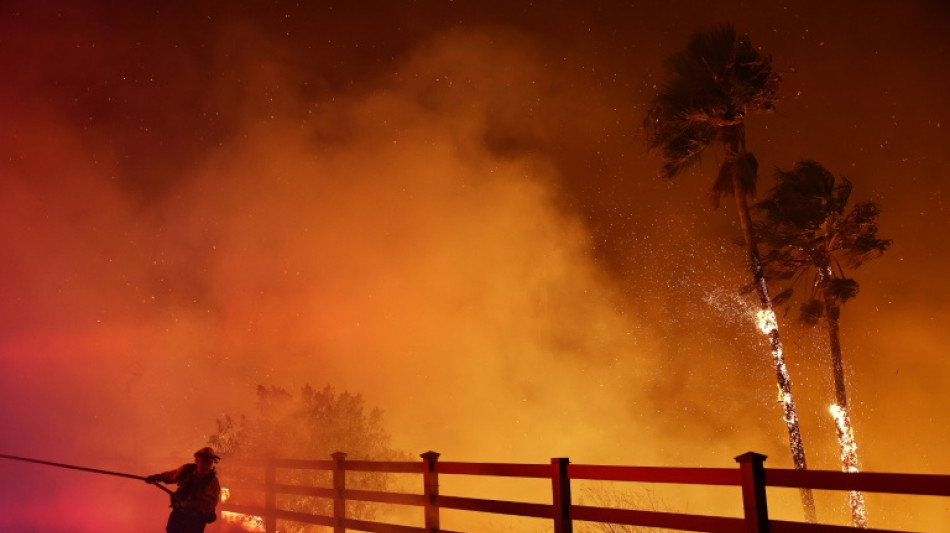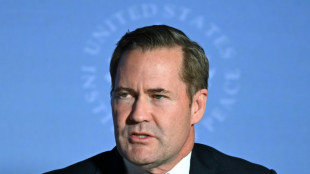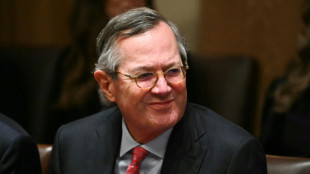
-
 Brazil binman finds newborn baby on garbage route
Brazil binman finds newborn baby on garbage route
-
US senator smashes record with marathon anti-Trump speech

-
 Trump advisor Waltz faces new pressure over Gmail usage
Trump advisor Waltz faces new pressure over Gmail usage
-
Niger junta frees ministers of overthrown government

-
 Trump set to unleash 'Liberation Day' tariffs
Trump set to unleash 'Liberation Day' tariffs
-
Boeing chief to acknowledge 'serious missteps' at US Senate hearing

-
 Real Madrid hold Real Sociedad in eight-goal thriller to reach Copa del Rey final
Real Madrid hold Real Sociedad in eight-goal thriller to reach Copa del Rey final
-
Nuno salutes 'special' Elanga after stunning strike fires Forest

-
 PSG survive scare against Dunkerque to reach French Cup final
PSG survive scare against Dunkerque to reach French Cup final
-
Sundowns edge Esperance as crowd violence mars quarter-final

-
 Nottingham Forest beat Man Utd, Saka scores on Arsenal return
Nottingham Forest beat Man Utd, Saka scores on Arsenal return
-
Elanga wonder-goal sinks Man Utd as Forest eye Champions League berth

-
 Stock markets mostly advance ahead of Trump tariffs deadline
Stock markets mostly advance ahead of Trump tariffs deadline
-
US movie theaters urge 45-day 'baseline' before films hit streaming

-
 Saka scores on return as Arsenal beat Fulham
Saka scores on return as Arsenal beat Fulham
-
Third-division Bielefeld shock holders Leverkusen in German Cup

-
 Ball-blasting 'Torpedo bats' making waves across MLB opening weekend
Ball-blasting 'Torpedo bats' making waves across MLB opening weekend
-
Newsmax shares surge more than 2,000% in days after IPO

-
 Thousands of Hungarians protest against Pride ban law
Thousands of Hungarians protest against Pride ban law
-
GM leads first quarter US auto sales as tariffs loom

-
 Tesla sales tumble in Europe in the first quarter
Tesla sales tumble in Europe in the first quarter
-
No 'eye for an eye' approach to US tariffs: Mexico

-
 NFL club owners back dynamic kickoffs, delay tush push vote
NFL club owners back dynamic kickoffs, delay tush push vote
-
Trump 'perfecting' new tariffs as nervous world braces

-
 Trump nominee says to press UK on Israel arms
Trump nominee says to press UK on Israel arms
-
French court says Le Pen appeal ruling could come before presidential vote

-
 The battle to control assets behind Bosnia crisis
The battle to control assets behind Bosnia crisis
-
Prabhsimran powers Punjab to IPL win over Lucknow

-
 Mass layoffs targeting 10,000 jobs hit US health agencies
Mass layoffs targeting 10,000 jobs hit US health agencies
-
Tiger's April Foolishness: plan to play Masters just a joke

-
 Myanmar quake toll passes 2,700, nation halts to honour victims
Myanmar quake toll passes 2,700, nation halts to honour victims
-
Turkish fans, artists urge Muse to cancel Istanbul gig

-
 US seeks death penalty for accused killer of insurance CEO
US seeks death penalty for accused killer of insurance CEO
-
UK govt moves to block sentencing guidelines for minority defendants

-
 Trump puts world on edge as 'Liberation Day' tariffs loom
Trump puts world on edge as 'Liberation Day' tariffs loom
-
Swedish journalist jailed in Turkey kept 'isolated': employer

-
 Stock markets advance ahead of Trump tariffs deadline
Stock markets advance ahead of Trump tariffs deadline
-
Gulf between Everton and Liverpool has never been bigger, says Moyes

-
 Finland to withdraw from anti-personnel mine ban treaty
Finland to withdraw from anti-personnel mine ban treaty
-
UK vows £20 million to boost drone and 'flying taxi' services

-
 Ford's US auto sales dip in first quarter as tariffs loom
Ford's US auto sales dip in first quarter as tariffs loom
-
Digging for box office gold, 'A Minecraft Movie' hits cinemas

-
 Southampton boss Juric desperate to avoid Premier League 'worst team' tag
Southampton boss Juric desperate to avoid Premier League 'worst team' tag
-
Thailand rescue dogs double as emotional support

-
 Five takeaways from Marine Le Pen verdict
Five takeaways from Marine Le Pen verdict
-
Stock markets split ahead of Trump tariffs deadline

-
 Turkish fans, artists urge Muse to cancel Istanbul gig over protest dispute
Turkish fans, artists urge Muse to cancel Istanbul gig over protest dispute
-
Former captain Edwards named new England women's cricket coach

-
 Haaland ruled out for up to seven weeks: Man City boss Guardiola
Haaland ruled out for up to seven weeks: Man City boss Guardiola
-
UK Supreme Court opens car loans hearing as banks risk huge bill


Scientists struggle to explain record surge in global heat
The world has been getting hotter for decades but a sudden and extraordinary surge in heat has sent the climate deeper into uncharted territory -- and scientists are still trying to figure out why.
Over the past two years, temperature records have been repeatedly shattered by a streak so persistent and puzzling it has tested the best-available scientific predictions about how the climate functions.
Scientists are unanimous that burning fossil fuels has largely driven long-term global warming, and that natural climate variability can also influence temperatures one year to the next.
But they are still debating what might have contributed to this particularly exceptional heat surge.
Experts think changes in cloud patterns, airborne pollution, and Earth's ability to store carbon could be factors, but it would take another year or two for a clearer picture to emerge.
"Warming in 2023 was head-and-shoulders above any other year, and 2024 will be as well," said Gavin Schmidt, director of the NASA Goddard Institute for Space Studies, in November.
"I wish I knew why, but I don't," he added.
"We're still in the process of assessing what happened and if we are seeing a shift in how the climate system operates."
- 'Uncharted territory' -
When burned, fossil fuels emit greenhouse gases like carbon dioxide that trap heat near the Earth's surface.
As fossil fuel emissions have risen to record highs in 2023, average sea surface and air temperatures have curved upwards in a consistent, decades-long warming trend.
But in an unprecedented streak between June 2023 and September 2024, global temperatures were unlike anything seen before, said the World Meteorological Organization -- and sometimes by a considerable margin.
The heat was so extreme it was enough to make 2023 -- and then 2024 -- the hottest years in history.
"The record global warmth of the past two years has sent the planet well into uncharted territory," Richard Allan, a climate scientist from the UK's University of Reading, told AFP.
What occurred was "at the limit of what we would expect based on existing climate models", Sonia Seneviratne, a climatologist from ETH Zurich in Switzerland, told AFP.
"But the overall long-term warming tendency is not unexpected" given the amount of fossil fuels being burned, she added.
- 'Difficult to explain' -
Scientists said that climate variability could go some way to explaining what happened.
2023 was preceded by a rare, three-year La Nina phenomenon that had a strong cooling effect on the planet by pushing excess heat into the deep oceans.
This energy was released back to the surface when an opposite, warming El Nino event took over in mid-2023, boosting global temperatures.
But the heat has lingered even after El Nino peaked in January.
Temperatures have not fallen as fast as they rose, and November was still the second-warmest on record.
"It is difficult to explain this at the moment," said Robert Vautard, a member of the UN's climate expert panel IPCC. "We lack a bit of perspective.
"If temperatures do not drop more sharply in 2025, we will really have to ask ourselves questions about the cause," he told AFP.
- Jury out -
Scientists are looking for clues elsewhere.
One theory is that a global shift to cleaner shipping fuels in 2020 accelerated warming by reducing sulphur emissions that make clouds more mirror-like and reflective of sunlight.
In December, another peer-reviewed paper looked at whether a reduction in low-lying clouds had let more heat reach Earth's surface.
At the American Geophysical Union conference this month, Schmidt convened scientists to explore these theories and others, including whether solar cycles or volcanic activity offered any hints.
There are concerns that without a more complete picture, scientists could be missing even more profound and transformational shifts in the climate.
"We cannot exclude that some other factors also further amplified the temperatures... the verdict is still out," said Seneviratne.
Scientists this year warned that Earth's carbon sinks -- such as the forests and oceans that suck CO2 from the atmosphere -- had suffered an "unprecedented weakening" in 2023.
This month, the US National Oceanic and Atmospheric Administration said the Arctic tundra, after locking away C02 for millennia, was becoming a net source of emissions.
Oceans, which have acted as a massive carbon sink and climate regulator, were warming at a rate scientists "cannot fully explain", said Johan Rockstrom of the Potsdam Institute for Climate Impact Research.
"Could this be a first sign of a planet starting to show a loss of resilience? We cannot exclude it," he said last month.
B.Finley--AMWN


